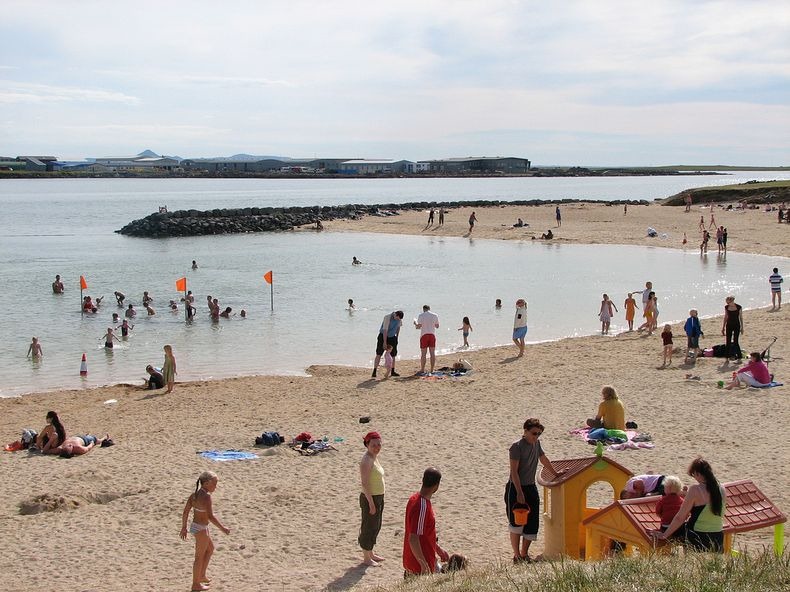Artificially Heated Nautholsvik Geothermal Beach, Iceland
In Iceland the sea is normally far too cold to tempt swimmers, but at Nautholsvik bay in Reykjavik, the capital city of Iceland, a thermal beach has been created, where natural hot water flows out into the sea, and you can frolic in the waves as if you were in the Mediterranean.
While the sun might not provide sufficient heat to keep the country and its seas warm, Iceland has been blessed with an abundance of volcanoes, geysers and natural hot springs, thanks to its advantageous location along the Mid Atlantic ridge - a deep sea mountain range with a high concentration of volcanoes. Heat from the Earth's core, where temperatures may reach 4,000-7,000°C, rises up to the surface in the form of hot water that seeps through fissures, cracks and permeable rock, allowing many countries like Iceland to easily take advantage of these naturally occurring heat supplies.

Photo credit
Reykjavik has, for a long time, been using geothermal energy to keep the city and its people warm by drawing up hot water from natural springs and heating houses as early as 1930. Today, geothermal energy powers the entire city - with an electricity network harnessing 750 MW of thermal power from steam, and a hot water distribution system generating 60 million cubic meters of hot water annually.
During the 80‘s a hot stream called Heiti Lækurinn, that runs from some hot water reservoir tanks situated near Nauthólsvík, was very popular for bathing until it was closed in 1985. Shortly after, during the cleansing of the city‘s shoreline, the idea of the sea bathing facilities in Nauthólsvík was carried forward.
The geothermal beach in Nautholsvik was opened in 2000. Golden beach sand was brought in all the way from Morocco and an enclosure was created by erecting a big seawall to form an artificial lagoon. Hot geothermal water is diverted into the lagoon where it fuses with the cold seawater and brings the temperature up from a chilly 4°- 6°C to a comfortable 15°-19°C. The goal with this project was to make the bay a diverse outdoor area with numerous possibilities such as sunbathing, sea bathing and sailing.
The following summer, in 2001, a service center opened at the Geothermal beach with changing rooms, hot showers and possibility to buy hot drinks and chocolate among other things. A big hot tub was built in front of the service center which is maintained at slightly higher temperatures of 30° - 38°C. The beach is very popular in the summertime and is progressively becoming a hit in the wintertime as well.

Photo credit

Photo credit

Photo credit

Photo credit

Photo credit

Photo credit

Photo credit
Sources: Danish Architecture Centre, Nautholsvik.is

Photo credit
Reykjavik has, for a long time, been using geothermal energy to keep the city and its people warm by drawing up hot water from natural springs and heating houses as early as 1930. Today, geothermal energy powers the entire city - with an electricity network harnessing 750 MW of thermal power from steam, and a hot water distribution system generating 60 million cubic meters of hot water annually.
During the 80‘s a hot stream called Heiti Lækurinn, that runs from some hot water reservoir tanks situated near Nauthólsvík, was very popular for bathing until it was closed in 1985. Shortly after, during the cleansing of the city‘s shoreline, the idea of the sea bathing facilities in Nauthólsvík was carried forward.
The geothermal beach in Nautholsvik was opened in 2000. Golden beach sand was brought in all the way from Morocco and an enclosure was created by erecting a big seawall to form an artificial lagoon. Hot geothermal water is diverted into the lagoon where it fuses with the cold seawater and brings the temperature up from a chilly 4°- 6°C to a comfortable 15°-19°C. The goal with this project was to make the bay a diverse outdoor area with numerous possibilities such as sunbathing, sea bathing and sailing.
The following summer, in 2001, a service center opened at the Geothermal beach with changing rooms, hot showers and possibility to buy hot drinks and chocolate among other things. A big hot tub was built in front of the service center which is maintained at slightly higher temperatures of 30° - 38°C. The beach is very popular in the summertime and is progressively becoming a hit in the wintertime as well.

Photo credit

Photo credit

Photo credit

Photo credit

Photo credit

Photo credit

Photo credit
Sources: Danish Architecture Centre, Nautholsvik.is